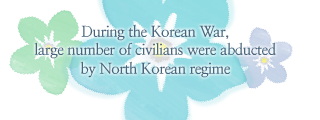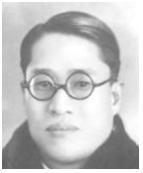Name: admin
2013-12-26 16:07:46 | Hit 17185
Files :  Lee Hyung-ho.docx
Lee Hyung-ho.docx
 Lee Hyung-ho.docx
Lee Hyung-ho.docx
Abductee: Lee Hyung-ho
Recorded Date: December 12th, 2006
Profile of Abductee
Name: Lee Hyung-ho (male)
Date of Birth: August 17, 1897
Pace of Birth: Anjoong, Pyeongtaek Gyeonggi-do
Last Address: 288-4 Donam-dong, Seongbuk-gu, Seoul, South Korea
Date of abduction: July 6, 1950 (age 53)
Place of abduction: Home (near Donam Elementary school)
Occupation: Doctor (Cheonhodang Hospital)
Education/Career: Yangchung Middle school, Gyeongseong Medical School/ First President of the Athletic Association for Boys and Girls, Political Activities
Dependants: 2 sons
Appearance/Personality: Active and Generous
Profile of Testifier
Name: Lee Jun-mo (born in 1932)
Relations: First Son
Type of Witness: Direct witness
Summary of Abduction
- In order to flee from the Communists he came out of the house and set out to a refuge but right after he left his house, 3~4 of the North Korean People’s Army arrested him.
- Abductee’s sons were hiding in the basement of the house, they saw a line of people being captured and taken to the North, but they couldn’t find their father among the line of people.
- After father’s abduction, the older son who was eighteen at that time, was the target to be drafted by the North to supplement the so-called ‘Voluntary Army’, so desperately hid himself fleeing place to place, in order to remain head of household and take care of his younger brother.
Detail of the Abduction
Q. What was the situation like when the war broke out?
When the Korean War broke out, I lived with my father and a younger brother. I lost my mother when I was 14 years old. After working seven years as a physician at Sunhwa Hospital, my father opened his own clinic at Jongno 4-ga near the Royal Ancestral Shrine. And he relocated it near Donam Elementary school after five years.
The only jobs possible for Korean intellectuals under the Japanese occupation were either an official working for the Japanese government or independent business. That was why my father chose to be a doctor. But now I come to think of it, the choice was not quite right for him because he was such an active and outgoing man.
Q. Did he participate any other organizations?
After Korea gained Independence, my father started to participate not only in political activities but also in promotion of sports. He established an athletic association for boys and girls and became the first chairperson. He was also a very sociable and highly respected man with broad social relationships. Doctors at the time were the elites in the society, respected for their medical capacity and leadership in the society. My father fulfilled his social responsibility by sharing his wisdom with others and providing financial support for the poor to further their education.
Q. How did your family try to evacuate Seoul when the war broke out?
When the Korean War broke out, my father contacted government officials to find out the exact situation of the war, but the only words he heard from them were “Everything is under control.” The national broadcasting stations also kept telling lies to the public. So we did not flee and eventually my father got abducted at his home in Donam-dong.
In the evening of the day before my father was taken by the North, an ROK colonel called him and asked if he could sleep over in our house and he said yes. And we waited for him that night but he never showed up. Around 2 am, we heard the sounds of gunshots. And at dawn, we could see the tanks of the North Korean Army entering the town over the Miari ridge.
Only after we saw the tanks with our own eyes, could we realize that the government had been lying about our army putting up a good fight against the North. My family hurriedly packed our things and left home to escape Seoul at around 7 in the morning. We went to Samseon-gyo but a gun-battle was already taking place there.
I still cannot forget a second lieutenant and two private soldiers who were desperately firing guns at the North Korean tanks. There were only three of them on our side and they must have been killed in the battle.
Q. How was he abducted?
Realizing the seriousness of the situation at Samseon-gyo, we came back home to discuss what to do next. We decided to take a refugee in the house of my father’s friend in Seongbuk-dong and we were about to leave home when a group of people from the North Korean Security Bureau rushed into the house.
They asked if there was Lee Hyung-ho and my father said that he was the man they were looking for. They took him, saying that he would be released soon. My father did not lose his dignity, holding his head straight up, when being taken to the Seongbuk police station. I could not do anything but to watch him being taken away and that was the last time I saw him. It was July 6th, 1950.
Q. How did you two live without your father, and how weren’t you drafted by the North?
With my father’s absence, my brother and I became orphans with nobody to rely on. We were treated badly by neighbors who thought my father had betrayed his own country to help the North Korean government.
I could not even think about going out and looking for my father because I was eighteen, a perfect age for being sent to the voluntary army if captured. I had to take care of my younger brother. Without me, he would be devastated. Under the surveillance of the North Korean Security Bureau and Internal Affairs Agency officers and the angry looks from the neighbors, my brother and I stayed at home holding our breath.
The officers from the North Korean Security Bureau and the Internal Affairs Agency officers often searched our house, especially at night. So I had to change my hiding place frequently in the house. I hid in the basement, under the floor, in a closet and in many other places. My brother stood guard at the entrance door whenever they tried to get into the house searching for me and opened the door only after I hid myself in a safe place.
I always carried a knife with me when hiding in case of being found. My hiding with no proper food and sleep continued for three months until Seoul was recaptured by the ROK Army.
Q. How did you take care of your younger brother?
In 1952, when I was twenty, I joined in the ROK army and my younger brother asked me to take him with me, crying hard. I promised myself not to leave my brother ever again. I decided not to care about what other people would say so I reassured him, saying “You’ll live with me in the unit. I’ll take you wherever I go, even to the front lines. You don’t have to worry about food. I am an officer, you know. I’ll take care of everything. So stand tall and worry nothing.”
My unit belonged to the operation department at the artillery headquarters reorganized in case the war needed more units at the front. When the whole unit left Seoul, I put a military uniform on my brother’s still small body. He turned into a kid soldier whose helmet constantly came down to cover his eyes because it was too big for him.
When I went to a front line in an operation, I took him with me by putting him in the fire direction center vehicle. It was risky, but it was better than leaving him behind all by himself.
Reason Behind the Abduction
Q. Why do you think your father was abducted?
He was a doctor and very useful to North Korea in such a war time, in a new-born country.
News after the Abduction
Q. Do you know where they took him? Or any news about him after the abduction?
No not at all. One day at dawn, loud shouts and sounds of scuffing shoes woke me up. It was mid September when I was still hiding in the house and the UN allied forces were pushing the North Korean army to the north after the Operation Chromites led by General Douglas MacArthur. I peeked outside the window and saw a long line of people being dragged toward the Miari ridge.
I thought that my father must be in the line, but I could do nothing except just watching them through the window. My heart aches at the thought that my father must have been devastated and helpless when he passed by our house, knowing that my brother and I were still there. I deeply regret for not going out there and rescue him. I should have at least tried. I was weak and cowardly. I still feel ashamed of myself.
Recorded Date: December 12th, 2006
Profile of Abductee
Name: Lee Hyung-ho (male)
Date of Birth: August 17, 1897
Pace of Birth: Anjoong, Pyeongtaek Gyeonggi-do
Last Address: 288-4 Donam-dong, Seongbuk-gu, Seoul, South Korea
Date of abduction: July 6, 1950 (age 53)
Place of abduction: Home (near Donam Elementary school)
Occupation: Doctor (Cheonhodang Hospital)
Education/Career: Yangchung Middle school, Gyeongseong Medical School/ First President of the Athletic Association for Boys and Girls, Political Activities
Dependants: 2 sons
Appearance/Personality: Active and Generous
Profile of Testifier
Name: Lee Jun-mo (born in 1932)
Relations: First Son
Type of Witness: Direct witness
Summary of Abduction
- In order to flee from the Communists he came out of the house and set out to a refuge but right after he left his house, 3~4 of the North Korean People’s Army arrested him.
- Abductee’s sons were hiding in the basement of the house, they saw a line of people being captured and taken to the North, but they couldn’t find their father among the line of people.
- After father’s abduction, the older son who was eighteen at that time, was the target to be drafted by the North to supplement the so-called ‘Voluntary Army’, so desperately hid himself fleeing place to place, in order to remain head of household and take care of his younger brother.
Detail of the Abduction
Q. What was the situation like when the war broke out?
When the Korean War broke out, I lived with my father and a younger brother. I lost my mother when I was 14 years old. After working seven years as a physician at Sunhwa Hospital, my father opened his own clinic at Jongno 4-ga near the Royal Ancestral Shrine. And he relocated it near Donam Elementary school after five years.
The only jobs possible for Korean intellectuals under the Japanese occupation were either an official working for the Japanese government or independent business. That was why my father chose to be a doctor. But now I come to think of it, the choice was not quite right for him because he was such an active and outgoing man.
Q. Did he participate any other organizations?
After Korea gained Independence, my father started to participate not only in political activities but also in promotion of sports. He established an athletic association for boys and girls and became the first chairperson. He was also a very sociable and highly respected man with broad social relationships. Doctors at the time were the elites in the society, respected for their medical capacity and leadership in the society. My father fulfilled his social responsibility by sharing his wisdom with others and providing financial support for the poor to further their education.
Q. How did your family try to evacuate Seoul when the war broke out?
When the Korean War broke out, my father contacted government officials to find out the exact situation of the war, but the only words he heard from them were “Everything is under control.” The national broadcasting stations also kept telling lies to the public. So we did not flee and eventually my father got abducted at his home in Donam-dong.
In the evening of the day before my father was taken by the North, an ROK colonel called him and asked if he could sleep over in our house and he said yes. And we waited for him that night but he never showed up. Around 2 am, we heard the sounds of gunshots. And at dawn, we could see the tanks of the North Korean Army entering the town over the Miari ridge.
Only after we saw the tanks with our own eyes, could we realize that the government had been lying about our army putting up a good fight against the North. My family hurriedly packed our things and left home to escape Seoul at around 7 in the morning. We went to Samseon-gyo but a gun-battle was already taking place there.
I still cannot forget a second lieutenant and two private soldiers who were desperately firing guns at the North Korean tanks. There were only three of them on our side and they must have been killed in the battle.
Q. How was he abducted?
Realizing the seriousness of the situation at Samseon-gyo, we came back home to discuss what to do next. We decided to take a refugee in the house of my father’s friend in Seongbuk-dong and we were about to leave home when a group of people from the North Korean Security Bureau rushed into the house.
They asked if there was Lee Hyung-ho and my father said that he was the man they were looking for. They took him, saying that he would be released soon. My father did not lose his dignity, holding his head straight up, when being taken to the Seongbuk police station. I could not do anything but to watch him being taken away and that was the last time I saw him. It was July 6th, 1950.
Q. How did you two live without your father, and how weren’t you drafted by the North?
With my father’s absence, my brother and I became orphans with nobody to rely on. We were treated badly by neighbors who thought my father had betrayed his own country to help the North Korean government.
I could not even think about going out and looking for my father because I was eighteen, a perfect age for being sent to the voluntary army if captured. I had to take care of my younger brother. Without me, he would be devastated. Under the surveillance of the North Korean Security Bureau and Internal Affairs Agency officers and the angry looks from the neighbors, my brother and I stayed at home holding our breath.
The officers from the North Korean Security Bureau and the Internal Affairs Agency officers often searched our house, especially at night. So I had to change my hiding place frequently in the house. I hid in the basement, under the floor, in a closet and in many other places. My brother stood guard at the entrance door whenever they tried to get into the house searching for me and opened the door only after I hid myself in a safe place.
I always carried a knife with me when hiding in case of being found. My hiding with no proper food and sleep continued for three months until Seoul was recaptured by the ROK Army.
Q. How did you take care of your younger brother?
In 1952, when I was twenty, I joined in the ROK army and my younger brother asked me to take him with me, crying hard. I promised myself not to leave my brother ever again. I decided not to care about what other people would say so I reassured him, saying “You’ll live with me in the unit. I’ll take you wherever I go, even to the front lines. You don’t have to worry about food. I am an officer, you know. I’ll take care of everything. So stand tall and worry nothing.”
My unit belonged to the operation department at the artillery headquarters reorganized in case the war needed more units at the front. When the whole unit left Seoul, I put a military uniform on my brother’s still small body. He turned into a kid soldier whose helmet constantly came down to cover his eyes because it was too big for him.
When I went to a front line in an operation, I took him with me by putting him in the fire direction center vehicle. It was risky, but it was better than leaving him behind all by himself.
Reason Behind the Abduction
Q. Why do you think your father was abducted?
He was a doctor and very useful to North Korea in such a war time, in a new-born country.
News after the Abduction
Q. Do you know where they took him? Or any news about him after the abduction?
No not at all. One day at dawn, loud shouts and sounds of scuffing shoes woke me up. It was mid September when I was still hiding in the house and the UN allied forces were pushing the North Korean army to the north after the Operation Chromites led by General Douglas MacArthur. I peeked outside the window and saw a long line of people being dragged toward the Miari ridge.
I thought that my father must be in the line, but I could do nothing except just watching them through the window. My heart aches at the thought that my father must have been devastated and helpless when he passed by our house, knowing that my brother and I were still there. I deeply regret for not going out there and rescue him. I should have at least tried. I was weak and cowardly. I still feel ashamed of myself.
No |
Title |
Name |
Date |
Hit |
|---|---|---|---|---|
| 42 | Yun Tae-kyong |
admin |
13-12-26 | 2428 |
| 41 | Lee Ju-sin |
admin |
13-12-26 | 2033 |
| 40 | Son Hae-kyeong |
admin |
13-12-26 | 7046 |
| 39 | Seo Seung-kun |
admin |
13-12-26 | 2327 |
| 38 | Seo Byeong-ho |
adimn |
13-12-26 | 2542 |
| 37 | Park Sung-woo |
admin |
13-12-26 | 2082 |
| 36 | Park Hyon-Myong |
admin |
13-12-26 | 2272 |
| 35 | Lee Seong-hwan |
admin |
13-12-26 | 2514 |
| 34 | Lee In-hyeon |
admin |
13-12-26 | 2022 |
| 33 | Lee Hyung-ho |
admin |
13-12-26 | 17184 |
| 32 | Lee Gyu-chan |
admin |
13-12-26 | 5057 |
| 31 | Lee Gwang-soo |
admin |
13-12-26 | 2533 |
| 30 | Lee Gil-yong |
admin |
13-12-26 | 2222 |
| 29 | Lee Chae-deok |
admin |
13-12-26 | 16324 |
| 28 | Lee Bong-woo |
admin |
13-12-26 | 3358 |
| 27 | Kwon Tae-sul |
admin |
13-12-26 | 2615 |
| 26 | Kim Yu-yon |
admin |
13-12-26 | 2916 |
| 25 | Kim Ki-Jeong |
admin |
13-12-26 | 2548 |
| 24 | Kim Jae-bong |
admin |
13-12-26 | 2236 |
| 23 | Kim Gyeong-do |
admin |
13-12-26 | 2170 |






















 FAX : (82)31-930-6099
FAX : (82)31-930-6099
